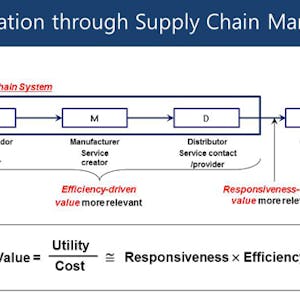Supply Chain Management A Learning Perspective
As a human being, we all consume products and/or services all the time. This morning you got up and ate your breakfast, e.g., eggs, milk, bread, fresh fruits, and the like. After the breakfast, you drove your car to work or school. At your office, you used your computer, perhaps equipped with 27” LCD monitor. During your break, you drank a cup of coffee and played with your iPhone. So on and so forth. You probably take it for granted that you can enjoy all of these products. But if you take a closer look at how each of these products can be made and eventually delivered to you, you will realize that each one of these is no short of miracle. For example, which fruit do you like? Consider fresh strawberries. In order for the strawberries to be on your breakfast table, there must be numerous functions, activities, transactions, and people involved in planting, cultivating, delivering, and consuming strawberries. Moreover, all of these functions, activities, transactions, and people are connected as an integral chain, through which physical products like strawberries themselves and virtual elements such as information and communication flow back and forth constantly. By grouping related functions or activities, we have a supply chain, comprised of four primary functions such as supplier, manufacturer, distributor, and finally consumer. A supply chain is essentially a value chain. For the society or economy as a whole, the goal is to maximize value, i.e., to create satisfactory value without spending too much. In order to create the maximum value for the strawberry supply chain, every participant in the chain must carry out its function efficiently. In addition, all of the members must coordinate with each other effectively in order to ensure value maximization. We have to face the same issues for almost all the products and services we take for granted in our everyday life, e.g., cars, hamburgers, haircuts, surgeries, movies, banks, restaurants, and you name it!
In this course, we want to understand fundamental principles of value creation for the consumers or the market. We try to answer questions like how the product or service is made, how the value-creating activities or functions are coordinated, who should play what leadership roles in realizing all these, and so on. As our course title hints, we approach all of these issues from a learning perspective, which is dynamic in nature and emphasizes long-term capability building rather than short-term symptomatic problem solving.
None
Syllabus
Syllabus - What you will learn from this course
Week 1
Re-opening Introduction
Week 2
Introduction to Value, Value Creation, and Supply Chain Management
Week 3
Management Capability
Week 4
Learning Perspective
Week 5
Quality Management
Week 6
New Product Innovation
Week 7
Supply Chain Strategy I: Structural and Infrastructural Dimensions
Week 8
Supply Chain Strategy II: Coordination for Value Creation
Week 9
Supply Chain Globalization and Sustainability
Week 10
Final Exam
FAQ
When will I have access to the lectures and assignments?
Access to lectures and assignments depends on your type of enrollment. If you take a course in audit mode, you will be able to see most course materials for free. To access graded assignments and to earn a Certificate, you will need to purchase the Certificate experience, during or after your audit. If you don't see the audit option:
What will I get if I purchase the Certificate?
When you purchase a Certificate you get access to all course materials, including graded assignments. Upon completing the course, your electronic Certificate will be added to your Accomplishments page - from there, you can print your Certificate or add it to your LinkedIn profile. If you only want to read and view the course content, you can audit the course for free.
Is financial aid available?
Yes. In select learning programs, you can apply for financial aid or a scholarship if you can’t afford the enrollment fee. If fin aid or scholarship is available for your learning program selection, you’ll find a link to apply on the description page.
Reviews
Thank you for giving me excellent information on supply chain management.It is very helpful course for me. Thank you Korea advanced institute of science and technology and coursera.
A very good experience. The subject covered is much more than supply chain management. A well-presented lecture. However the content looks dated, an update will be very helpful.
I was really an honor to have certification under KAIST and professor Bowon Kim, it was really a great experience to have this certification under your guidance. Thank you.
Professor Kim is extraordinary.
Used very simple methods to handle this management subject.
I am thoroughly enjoyed this course as well as professor's way of teaching
